Get In Touch
Info@fitfaysal.com

Want to reduce your carb intake?
Here’s a list of low-carb foods you can find in Nigeria.
Most of our meals are dense carbohydrate foods, from white rice to bread, yam, garri, and so many others.
Trust me, the drawbacks stack up when you eat these foods day after day.
If you’re someone going on a low-carb diet, trying to lose weight, or looking for diabetic-friendly foods to control blood sugar levels, this article is for you.
Look no further; keep the jollof rice and fufu aside for now, and let’s get into it.
Eggs, often referred to as nature’s perfect food, and meats, ranging from the tender cuts of beef and goat meat to the flavorful chicken and fish, contain zero carbs.

Eggs provide a substantial source of protein and other nutrients without carbs, making them a perfect choice for anyone going on a low-carb diet.
Did you know that eggs age more in a day at room temperature than in a week in the fridge?
Pretty helpful tip.
Beef stands tall in the no-carb hierarchy.
It is a prime source of protein and is more nutritionally dense than other meats, making it a go-to for those watching their carb intake.
Chicken takes on countless delicious forms, from roasted and fried to grilled chicken suya.
It’s a lean protein that contains no carbs and is high in protein and flavor.
Did you know chickens are the closest living descendants of dinosaurs?
Shocker.
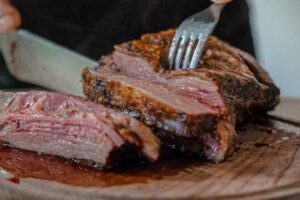
Lamb, popularly known as ram meat in Nigeria, is a great pick for those seeking variety in their meat options.
They are naturally low in carbs while offering a healthy dose of protein.
100g of pork contains 0g of carbs and 297 calories.
Although pork isn’t as common in traditional Nigerian dishes, it is one of the most widely eaten meats in the world and has its place among low-carb eaters.
Pork is rich in protein, and many cuts contain minimal carbs.
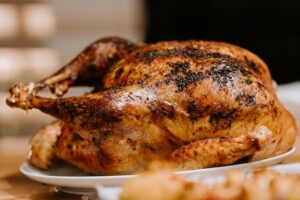
Here in Nigeria, turkey often graces our festive tables, but it’s a great no-carb choice year-round.
This lean poultry is filled with protein and provides zero carbs.
Did you know turkeys can see three times better than humans?
I hope they can also see how delicious they are.
While some sausages can contain fillers with carbs, many are low-carb gems. Check the ingredients to ensure they align with your dietary goals.
From succulent catfish to fresh shrimp and sardines, these oceanic wonders can enhance your meals while keeping your carb intake in check.
They are high in omega-3 fatty acids and iodine, both nutrients most of us don’t get enough of.

This fatty fish, filled with healthy omega-3 fatty acids, is rare and uncommon in Nigeria, and I would guess it’s because of its price.
Nonetheless, it’s highly nutritious and contains zero carbs.
Sardines, our delicious Nigerian staple, are packed with omega-3s, calcium, and vitamin D, making them a super nutritional addition to your low-carb meals. It’s a great option to add to a keto meal plan.

When it comes to low-carb dining, shrimp steal the show.
These little gems are more than just a tasty treat; they’re a nutritional powerhouse.
A local favorite, catfish contains no carbs and is rich in B vitamins and protein.
It adapts beautifully to our dishes, from spicy stews to smoky grills.
Tuna is a low-carb and high-protein fish, making it an excellent choice for a keto diet.
It’s rich in healthy fats and provides essential nutrients.
From creamy yogurts to rich, locally made cheeses, our Nigerian dairy offerings provide a wide range of options for those looking to embrace a low-carb lifestyle.

Although not as sweet as regular yogurt and slightly expensive, Greek yogurt is a low-carb superstar.
It’s packed with protein and probiotics, making it a healthy choice for your gut.

Butter, though in moderation, can enhance the flavor and texture of your foods and contains zero carbs.
Did you know butter has been around for over 9,000 years?
Pretty cool fact.
Awara, mostly consumed by northerners, contains few carbs, making it a preferred choice for those looking to add plant-based protein to their low-carb meals.
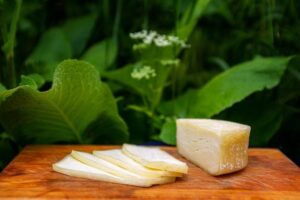
Rich in calcium and protein, cheese complements your low-carb dishes with its satisfying taste.
From mozzarella and cheddar to feta and cream cheese, there’s a cheese for every low-carb recipe.
Check out Is Jelly Good for Weight Loss?
Most vegetables are low in carbohydrates, except starchy root vegetables such as sweet potatoes and potatoes, which are high-carb foods.
Whether you prefer your vegetables stir-fried, blended into soups, or steamed, they are a great addition to your low-carb diet.
These bright and juicy fruits are surprisingly low in carbs.
They contain antioxidants like lycopene, which is known for its health benefits.
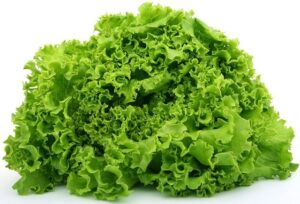
Crisp, fresh, and practically carb-free, lettuce is the perfect veggie for weight loss and your low-carb salads.
Cabbage is versatile and goes with most foods.
It is rich in vitamin C and fiber but low in carbs, unless you drizzle a load of salad cream on it.
Mushrooms are not only low in carbs but also provide a depth of flavor to your dishes.
They’re like nature’s flavor enhancers.
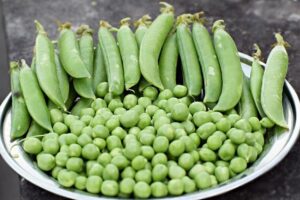
These fiber- and protein-rich beans are a fantastic low-carb option.
Add them to your recipes for a healthy twist.
They’re crisp, refreshing, and perfect for those hot afternoons.
It is a great snacking option, and when mixed with lettuce or cabbage, you get a low-carb, low-calorie meal.
Fun fact: Cucumbers can cool the body and blood, which is why we say, “Cool as a cucumber.”
Vibrant and flavorful, bell peppers are a colorful addition to your low-carb meals.
They bring a satisfying crunch and a burst of taste.
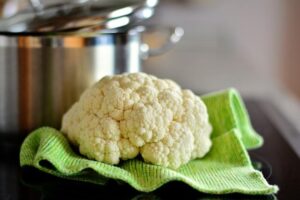
This versatile veggie is not only a low-carb wonder but also really low in calories.
Use it as a substitute for rice when going on a diet.
Garden eggs are a common vegetable consumed by most people.
Whether raw, roasted, or grilled, it is relatively low in carbohydrates and can be a sweet addition to our Nigerian diet.
Onions are not only flavorful but also relatively low in carbohydrates.
These versatile vegetables can enhance the taste of your dishes and support your low-carb diet.
Choosing the best oils and fats can make all the difference in making a healthy, low-carb meal.
Check out the oils that bring out the best in your dishes while keeping your carb count in check.
A staple in our food, it is rich in vitamin E and antioxidants, making it a nutritious option for your low-carb recipes.
However, it is high in calories, which can cause weight gain, so go easy.
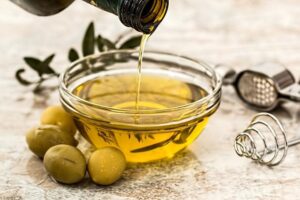
If you ask most people what the healthiest cooking oil is, they’ll most likely say olive oil, and they would be correct.
It contains virtually no carbs and contains monounsaturated fats, which are good for your heart.
Fun fact: Olive oil is technically a fruit juice.
Coconut is a source of healthy fats and contains no carbs.
It is known for its potential benefits, such as boosting energy levels and supporting weight loss.
While fruits are rich in nutrients, it can be hard to enjoy their natural sweetness while keeping those carbs low.
Check out some fruits that strike the balance between sweetness and low-carbohydrate.

These sweet red gems are relatively low in carbs.
They also contain healthy amounts of vitamin C, fiber, and antioxidants, making them a refreshing and healthy snack.
Perfect for our sometimes-hot weather.
It’s not only hydrating but also a source of vitamins A and C.
Fun fact: Watermelon is both a fruit and a vegetable.
They’re low in carbs and rich in healthy fats, particularly monounsaturated fats, and provide essential nutrients like vitamin E.
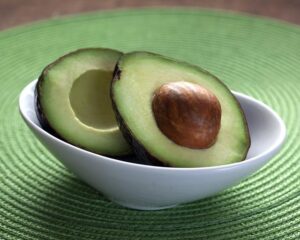
Avocados are considered a superfood. Aside from being high in protein and low in carbs, they contain various nutrients like healthy fats and vitamins K, C, and E.
Did you know that avocados contain more potassium than bananas and have more fiber than any other fruit?
Fascinating.
Peaches are a delightful low-carb fruit that adds a burst of natural sweetness to your diet.
Nuts and seeds are the tiny powerhouses of nutrition; they are usually high in fiber, fats, and protein.
From groundnuts to almonds, there’s a nutty delight for every keto enthusiast.

Groundnut, our local favorite, is a great source of healthy fats and protein.
In moderation, they fit well into a low-carb diet.
Almonds are on the higher end of low-carb snack options.
They’re rich in healthy fats, protein, fiber, vitamin E, and magnesium.
A small handful can give you a satisfying and nutritious kick.
Most drinks and beverages are packed with carbs; most teas alone don’t contain carbs until you chuck them full of sugar.
Black coffee, with zero carbs, is a perfect choice for low-carb dieters.
It provides a morning boost without interfering with your carb count.

This simple yet delightful mix not only keeps you hydrated but also adds a bit of flavor.
Lemon-infused water has no carbs.
Tea, especially herbal or green tea, usually doesn’t contain carbs.
To keep it that way, opt for minimal added sugar.
Sans is a delicious soda that tastes a bit like cream.
It is pretty much a cheat code for drinks, because it’s sweet but does not contain carbs or calories.
Yes, you can lose weight on Nigerian food.
Focus on adding lean proteins like grilled chicken or fish, plenty of vegetables, and controlled portions of carbohydrates like rice or yam.
Avoid excessive oil and high-calorie ingredients.
To lose weight, it’s best to avoid or limit foods high in calories, unhealthy fats, and refined carbohydrates.
Nigerian foods to be cautious with include fried plantains (dodo), fried yam, noodles, fried chips, akara, puff-puff, fried meats, palm oil rice, and high-calorie stews or soups made with excessive palm oil.
Additionally, control your portion sizes to prevent overeating.
Most definitely! Chicken and beef suya don’t usually contain carbohydrates, except when sugary marinades are used. Which is likely to be the case.
Traditional Egusi soup is made with melon seeds, palm oil, and non-starchy vegetables and is also topped with lean meats.
It is high in protein and fats with little to no carbs, which makes it great for a low-carb diet or keto-friendly.
Several Nigerian foods can be keto-friendly when prepared thoughtfully.
These include grilled or roasted meats (suya, grilled chicken), seafood, vegetables (especially leafy greens), and certain soups and stews with keto-approved ingredients.